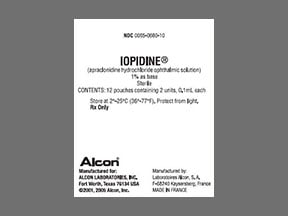
Iopidine Coupons & Savings Card – Discount Prices from $671.76
My prescription
Edit
1%, Iopidine (24 Solutions)
Select pharmacy

CVS
$679.62
COUPON PRICE
Walmart
$671.76
COUPON PRICE
Albertsons
$680.29
COUPON PRICE
Walgreens
$682.75
COUPON PRICEIopidine savings card
Show this card to your pharmacist
Walmart
$671.76
BIN
ID
PCN
GRP
019876
LH576E3B7F
CHIPPO
LHX
Powered by
Related alpha agonists prescriptions
More prescriptions for glaucoma
Related alpha agonists prescriptions
More prescriptions for glaucoma
Price history for Iopidine
24 Solutions, 1%
Average retail price for Iopidine
Average SaveHealth price for Iopidine
Our price history data is based on aggregated prescription data collected from participating pharmacies in America. Our prescription data updates daily to reflect the latest price changes. If you notice a missing data point, it means there wasn't sufficient data available to generate a monetary value for that date.
*Retail prices are based on pharmacy claims data, and may not be accurate when we don't have enough claims.
Iopidine dosage forms
Dosage Quantity Price from Per unit 1% 24 Solutions $671.76 $27.99
| Dosage | Quantity | Price from | Per unit |
|---|---|---|---|
| 1% | 24 Solutions | $671.76 | $27.99 |
What is the drug Iopidine used for?
Iopidine is used to reduce intraocular pressure in patients with open-angle glaucoma or ocular hypertension. It is often prescribed when other medications are not sufficient in controlling eye pressure.
Can I buy Iopidine over the counter?
Iopidine is a prescription medication and cannot be purchased over the counter. It requires a prescription from a healthcare provider.
What is the equivalent of Iopidine eye drops?
The equivalent of Iopidine (apraclonidine) eye drops is typically another medication used to lower intraocular pressure in the treatment of glaucoma or ocular hypertension. Brimonidine eye drops, such as Alphagan, are often considered an alternative. However, it is important for the individual to consult with an eye care professional to determine the most appropriate treatment for their specific condition.
Who can prescribe apraclonidine?
Apraclonidine can be prescribed by licensed healthcare professionals such as ophthalmologists, optometrists, or other physicians who are qualified to treat eye conditions.
What do Iopidine eye drops do?
Iopidine eye drops are used to reduce elevated intraocular pressure in patients with open-angle glaucoma or ocular hypertension. They work by decreasing the amount of fluid within the eye, thereby helping to prevent damage to the optic nerve and loss of vision.
